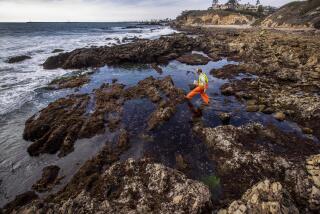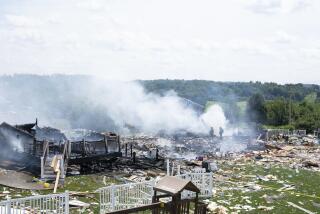Pipeline safety forum called after deadly Pennsylvania blast
- Share via
Reporting from Allentown, Pa. — Standing yards from the site of a gas explosion that tore through a Pennsylvania neighborhood and killed five people, Transportation Secretary Ray LaHood said Monday that he was working with pipeline owners, Congress and regulators to strengthen pipeline safety and make sure such tragedies don’t happen again.
LaHood said he was calling for a pipeline safety forum on April 18 in Washington, where state officials, industry leaders and regulators would discuss improving pipeline safety.
Investigators think it was a cracked distribution line that led to a massive explosion and fire Feb. 9, which leveled a block of row homes here. Six months earlier, on Sept. 9, a high-pressure gas line exploded in San Bruno, Calif., killing eight and destroying dozens of homes.
“This is our responsibility,” LaHood said. “People shouldn’t have to worry when they flip a light switch in their kitchen that it could cause an explosion in the front yard.”
Gas companies and pipeline operators need to do a “top to bottom review” of their pipeline systems as well, he said, and accelerate the replacement of high-risk, aging pipes. LaHood last month met with pipeline chief executives to get their support.
LaHood said he was again supporting a bill that would add federal inspectors and increase penalties on companies that violate safety rules. The bill would boost civil fines from $100,000 a day to $250,000 a day and from $1 million for a series of violations to $2.5 million. A similar bill failed to advance out of Congress last session.
Also part of LaHood’s plan are requirements that operators know the age and condition of their lines; that reporting and inspection rules be strengthened; and that information about pipelines and operators’ safety records be accessible to the public.
The Obama administration’s proposed budget would increase pipeline safety funding by 15%, LaHood said.
Rep. Bill Shuster (R-Pa.), chairman of the House subcommittee on railroads, pipelines and hazardous materials, said last month that he was unlikely to support increasing the number of federal inspectors.
Shuster released a statement Monday saying pipeline safety was one of his highest priorities, but he would not say whether he supported LaHood’s proposals.
The Transportation Department noted that although 2010 saw 36 pipeline incidents resulting in injury or death, such incidents are down nearly 50% in the last 20 years. But the Allentown blast and other incidents highlight the need to address aging pipelines, officials said.
In January, federal investigators reported that a series of weld defects had been found in detailed studies of the 54-year-old gas pipeline that failed in San Bruno. But the report by the National Transportation Safety Board did not conclude what caused the 30-inch pipeline to rupture. A final report is expected this year.
Allentown Mayor Ed Pawlowski on Monday said his city, which has some pipeline segments more than 100 years old, had 295 reports of leak investigations in the last 14 months, including nine that required neighborhood evacuations.
Survivors of the explosion and their relatives also spoke at the event.
“Just look across the street, that vast empty space — that is why there should be pipeline regulation,” said Michelle Hall, whose father- and mother-in-law died in the conflagration. “No one should have to tell their kids that their grandparents died this way. That is why there should be pipeline regulation.”
More to Read
Sign up for Essential California
The most important California stories and recommendations in your inbox every morning.
You may occasionally receive promotional content from the Los Angeles Times.













